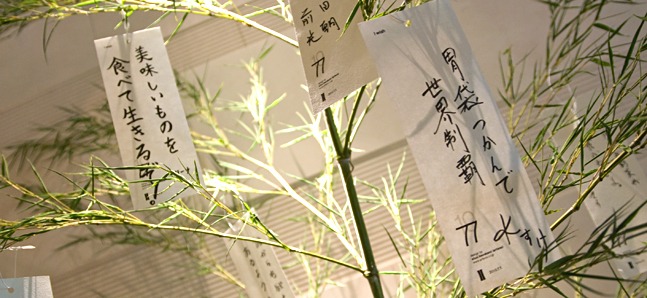
Posted: Mon Jul 26 2010
On July 7, at precisely 7 seconds and 7 minutes past 7pm, Restaurant-I held a celebration for people born in 1977. Attending this unique event were a handful of people from different fields who have been steadily working to make a difference to society. Conversations between the guests continued into the early hours of the morning and – who knows– perhaps a few of the ideas that came up in conversation will be sweeping across the world within the not too distant future.
Kentaro Minagawa (born May 17, 1977), alpine skier
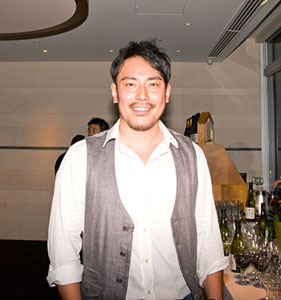
‘We grew up in a time where, in order to succeed, you had to make a name for yourself abroad. For those that came before us, especially in the sporting world, the norm was to concentrate on winning domestic competitions rather than attempting to compete internationally. In our day, it wasn’t just skiers from Japan that set out to test themselves against the Europeans, but rather skiers from a whole host of other countries, including America and Canada. In other sports – in football, for example – others born in 1977, such as Hidetoshi Nakata and Tsuneyasu Miyamoto, were finding new ways to help popularize their sports and gain recognition. The idea of others like ourselves, who had the same goal of making it on the world stage, would spur us on further – there was no shortage of motivation. The challenge we face is how best to bring what we’ve learned abroad back with us to Japan. I continue to ski in competitions abroad and personally feel a responsibility to share the knowledge I’ve gained with others. Japan is home to some of the best athletes in the world; however, when compared to some other countries, we still fall behind in terms of rules and teaching methodologies. To truly establish ourselves as a leading country on the international stage, I think we still need to more effort.
One of the most wonderful things about the Japanese people is our seriousness. People here understand the importance of double-checking the things that are truly important; no matter how proficient we may be at something, we will still ‘tap the stone bridge before crossing’ – as the saying goes.’
Shun Kawakami (born May 25, 1977), artist
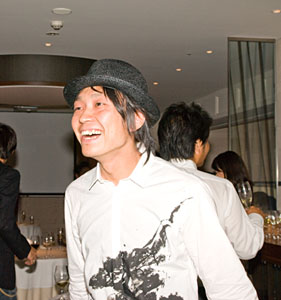
‘I never went to any of the famous art school in Japan; instead, from the very start, I simply thought that I’d like to make it abroad. As opportunities to work and exhibit overseas became more frequent, I found myself taking a deeper look at my own country. The more I went abroad, the more I began to think of myself as Japanese, which, in turn, gave me the idea of trying to convey aspects of the beauty of traditional Japan through my work. It may be simple, but the idea I’ve just begun working with is to show the world my own world.
The beauty of traditional Japan is fascinating – especially in how it deals with aspects such as space and time. Many of the traditional arts here, such as flower arrangement, calligraphy and the tea ceremony, are not only unique to Japan but also incredibly beautiful. When it comes to working abroad, being Japanese can be a real boon, because most people abroad simply don’t understand concepts such as “space” and “time” in the same way that we do. Plus, being Japanese gives you a kind of status. Even if you can’t speak their language, you’ll find that foreign people have an incredible interest when it comes to Japan – I feel that by expressing Japanese artwork abroad I am helping to create something new and exciting. I’ve tried creating designs similar to those of other foreign designers before; however, in doing so I realized that the easiest way to create something original is look back at the place where you came from, to your own identity. Designers coming from places such as Singapore, or Taiwan, for example, understand that their own domestic markets are relatively small, so they aim internationally from the outset. In that respect, I find that I have more in common with people from other Asian countries. I find people outside of Japan are more willing to try to understand and connect with the work I produce.
My goal is to represent Japan. I’d like to become a name that people associate with Japan without thinking. I’d like to change the world – with design and with art.’
Shizu Usami (born June 26, 1977), calligrapher
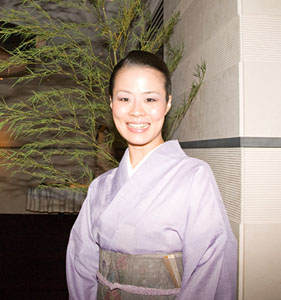
‘I feel that without a proper understanding of where we come from, we’ll not be able to reach our full potential. Knowing both who we are and where we come from helps us to give shape to both ourselves as individuals and to also to our country. I think that without this kind of knowledge, even if we can speak English, or French, or any other language, we can’t make a difference, because without proper content, words have no meaning. Nowadays, if all we want is merely a superficial understanding of the world then all we need to do is log on to the internet; however, if the aim is edification, then this kind of thing is meaningless. I think each of us needs to acquire something that will help us express what it means to be Japanese – something we can use to communicate with the outside world. We live in an age where communication is vital. Nowadays, it’s easier than ever to travel abroad and meet people from other countries, plus more and more people are visiting Japan from overseas; accordingly, I think it’s important for us to be more internationally minded than ever before. I think the more progressive we are as a country, the more progressive we need to be as a people.
I think that one of the best things about the Japanese people is our combination of flexibility and strength. As a people, we should continue to be both strong yet adaptable - regardless of gender. I think the writing system we use is truly beautiful. It’s different to a simple phonetic alphabet that uses letters to represent a particular sound; instead, most East Asian countries use ideographic characters to represent ideas. The shapes of their characters draw on shapes within their surroundings, and so when we see a character, we automatically think of the scenery that shaped it – which is why writing brings me joy, and why I continue to write.’
Mitsutomo Maeda (born June 2, 1977), film creator
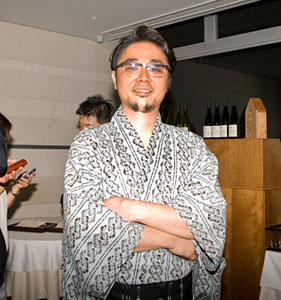
‘I think Japan connects directly to the rest of the world through Tokyo. Tokyo brings the world within easy reach of Japan. It’s as if, as Tokyo develops, it sticks its head out a little further into the world. I don’t think of it as us against the world, rather, I think that if we do what we ourselves find to be interesting then other people around the world will acknowledge and be stimulated by what we do. There’s no need to compete, however, if what we do for ourselves happens to bring us international recognition, then it becomes a win-win situation.
The best thing about the Japanese people is our modesty. However, I’m also glad that we have a country with a solid culture. Until the age of eighteen, I grew up in Okinawa and had a strong sense of kinship, I looked up to my elders and took care of my neighbours – I think this kind of thoughtfulness is something to treasure. By the way, before you ask why I’m wearing a yukata [an informal cotton kimono], I’m wearing it because today is tanabata [the seventh day of the seventh month of the lunar calendar].’
Keisuke Matsushima (born December, 20 1977), chef
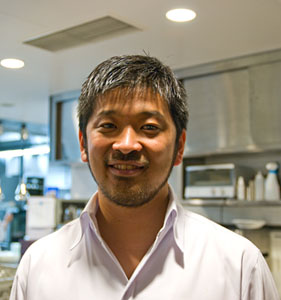
‘With so many people born in the same year, all gathered together in the same place, there’s a pretty exciting buzz this evening. I think it would be great if everyone from Japan could let go of their inhibitions and go and see what the world has to offer.
The best thing about the Japanese people is our diligence. However, on the other hand, we can sometimes be too diligent, I think it’s sometimes necessary to just kind of let loose. Sometimes, in order make further progress and get on in the world, the best thing to do is to step back and take a look at things from a different perspective. I think there’s nothing more effective than hard work; however, after deciding to undertake a new venture, it’s important to channel your efforts in the right direction. Hard work on its own won’t get you anywhere; before you begin burning the midnight oil, it’s important to work out a strategy. The French are very good at marketing – by which I mean that they are very good at working out strategies. You can gain a lot with a good strategy. Japanese people are prone to believe they can make significant gains simply by working harder than others; however, I think that we could do better if we put more effort into planning where it is we are heading and then putting in the extra effort necessary to get us there. We have a tendency to think that it’s enough simply to try your best, and there’s some value in that; however, this way of thinking can also be a weakness that holds us back; I think it’s something that we need to reconsider.
I’d like to help shatter some of the Japan’s disillusion. I think we need to renew our efforts – to get out there and compete! All we need is something to spur us into action.’
Tweets
- About Us |
- Work for Time Out |
- Send us info |
- Advertising |
- Mobile edition |
- Terms & Conditions |
- Privacy policy |
- Contact Us
Copyright © 2014 Time Out Tokyo













Add your comment